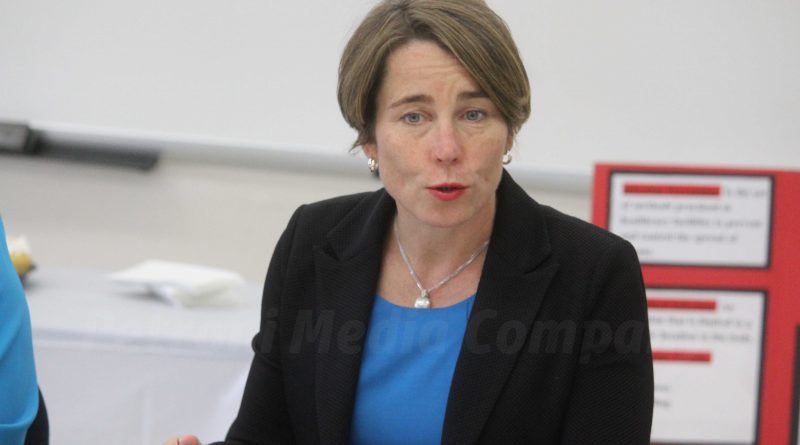The following is a press release from the Massachusetts Attorney General’s office submitted to SOURCE media. It is published as received.
***
[broadstreet zone=”51611″]
BOSTON – Today, July 13, Massachusetts Attorney General Maura Healey’s Office is leading a coalition of 18 attorneys general in filing a lawsuit to stop a new federal rule that threatens to bar hundreds of thousands of international students from studying in the United States.
The lawsuit, filed in the U.S. District Court in Massachusetts against the U.S. Department of Homeland Security (DHS) and U.S. Immigration and Customs Enforcement (ICE), challenges what the attorneys general call the federal government’s “cruel, abrupt, and unlawful action to expel international students amidst the pandemic that has wrought death and disruption across the United States.” Today’s lawsuit seeks an injunction to stop the entire rule from going into effect.
“The Trump Administration didn’t even attempt to explain the basis for this senseless rule, which forces schools to choose between keeping their international students enrolled and protecting the health and safety of their campuses,” AG Healey said. “Massachusetts is home to thousands of international students who make invaluable contributions to our educational institutions, communities, and economy. We are taking this action today to make sure they can continue to live and learn in this country.”
[broadstreet zone=”53230″]
Today’s lawsuit challenges an abrupt policy change by ICE to reverse guidance issued on March 13 that recognized the COVID-19 public health emergency, provided flexibility for schools, and allowed international students with F-1 and M-1 visas to take classes online for the duration of the emergency.
On July 6, ICE announced that international students can no longer live in the United States and take all of their classes online during the pandemic, upending months of careful planning by colleges and universities to limit in-person instruction in favor of remote learning and adapt their coursework for the fall semester, and leaving thousands of students with no other choice but to leave the country.
[broadstreet zone=”54526″]
ICE further demanded that educational institutions advise the federal government by July 15 whether they intend to offer only remote courses in the fall semester, and to certify by August 4 for each of the institutions’ international students that the student’s upcoming coursework this fall will be in person or a “hybrid” of in-person and online learning in order to maintain their visa status.
This demand comes not only amidst an ongoing nationwide emergency, but also at a time when many faculty, staff, and students are not on campus and may not even be in the country; students may not even have registered for their classes for the fall; and schools and individual teaching staff members may not yet have determined whether their classes will be held remotely, in person, or a combination.
The lawsuit details the substantial harms that the new rule places on schools and students. It also alleges that the federal government’s actions are arbitrary, capricious, and an abuse of discretion because they reverse previous guidance without explanation, input, or rationale – in violation of the Administrative Procedure Act – and fail to consider the need to protect public health and safety amidst the ongoing COVID-19 pandemic.

The attorneys general say the new rule and abrupt reversal of the previous guidance threatens their states in a number of ways:
- Fails to consider the health and safety of students, faculty, and staff;
- Fails to consider the tremendous costs and administrative burden it would impose on schools to readjust plans and certify students;
- Fails to consider that, for many international students, remote learning in their home countries is not possible;
- Imposes significant financial harm to schools, as international students pay hundreds of millions of dollars in tuition, housing, dining, and other fees;
- Imposes harm to schools’ academic, extracurricular, and cultural communities, as international students contribute invaluable perspectives and diverse skillsets; and
- Forces colleges and universities to offer in-person classes amid a pandemic or lose significant numbers of international students who will either have to leave the country, transfer, or disenroll from the school.
The lawsuit also alleges the new rule imposes significant economic harm by precluding thousands of international students from coming to and residing in the United States and finding employment in fields such as science, technology, biotechnology, healthcare, business and finance, and education, and contributing to the overall economy.
[broadstreet zone=”53820″]
Massachusetts hosts tens of thousands of international students each year – there are currently 77,000 with active student visas – and they are estimated to bring more than $3.2 billion to the economy each year. Massachusetts is home to 92 private colleges and universities and operates 29 public institutions of higher education, including 15 community colleges, nine state universities, and five separate campuses of the University of Massachusetts system.
Today’s lawsuit also includes 40 declarations from a variety of institutions affected by the new rule, including Northeastern University, Tufts University, University of Massachusetts, Boston University, Massachusetts Community Colleges, Massachusetts State Universities, the Association of Independent Colleges and Universities in Massachusetts, and the Greater Boston Chamber of Commerce, as well as Rochelle Walensky, a Harvard Medical School professor and chief of the Division of Infectious Diseases at Massachusetts General Hospital.
The lawsuit includes a request for immediate preliminary relief blocking the rule from going into effect while the case is litigated, and the attorneys general have requested a hearing as soon as possible. In a separate lawsuit filed by Harvard College and the Massachusetts Institute of Technology (MIT), the court will be holding a hearing on Tuesday at 3 p.m.
Joining Massachusetts in today’s lawsuit are the attorneys general from Colorado, Connecticut, Delaware, District of Columbia, Illinois, Maryland, Michigan, Minnesota, Nevada, New Jersey, New Mexico, Oregon, Pennsylvania, Rhode Island, Vermont, Virginia, and Wisconsin.
Handling the case for Massachusetts is Chief of AG Healey’s Civil Rights Division Abby Taylor and State Solicitor Bessie Dewar, with assistance from Child and Youth Protection Unit Director Angela Brooks and Assistant Attorneys General Katherine Dirks, Julie Green, Andrew Haile, Abrisham Eshghi, and Elizabeth Nsahlai.
[broadstreet zone=”59984″]
Giving statements of support were:
Marty Meehan, President, University of Massachusetts: “UMass stands with our 7,200 international students and fully supports Attorney General Maura’s effort to stop recent efforts by the Immigration and Customs Enforcement (ICE) to send these students back to their home country if their classes are fully online. ICE’s unanticipated action comes as UMass is finalizing complex plans for the fall semester amidst the ongoing public health emergency caused the COVID-19 pandemic. If allowed to take effect, these rules will create costly, confusing and unnecessary hurdles for our international students and our campus communities, place millions of dollars in university revenue at risk, and deprive the Commonwealth’s economy of a valuable source of talent and innovation.”
Ralph Martin, Senior Vice President and General Counsel at Northeastern: “We are grateful for the willingness of the Attorney General’s office to protect international students and institutions of higher education from the imposition of the DHS rules that will unnecessarily and unfairly burden international students and universities; the only purpose of these rules is to deter institutions of higher education from providing educational opportunities to international students. The rules are not only unfair, and if allowed to proceed, have the potential to endanger the safety of campus communities during the COVID pandemic.”
Richard Doherty, President, Association of Independent Colleges and Universities in Massachusetts: “This last-minute ruling by ICE has thrown chaos into a thoughtful and thorough planning process by our colleges. It will inflict significant economic and educational harm on our students, it will result in a stunning economic blow to the Commonwealth and it will cause turmoil for the educational plans for hundreds of thousands for international students across the country including the 71,000 students who study at our Massachusetts colleges and universities.”

Robert A. Brown, President of Boston University: “We were shocked at the Department of Homeland Security’s ill-considered guidelines on the enrollment of international students for the fall. The DHS ruling will be severely detrimental to the education of thousands of international students and will cause long-term damage to the world’s view of our country and our openness to talented students from everywhere. Boston University strongly supports Attorney General Healey’s legal efforts to stop these harmful new rules from going into effect.”
Mary Jeka, Senior Vice President & General Counsel at Tufts University: “The new guidance from ICE is unexpected, unreasonable, and unjust, creating monumental and, in many cases, insurmountable challenges for both students and universities. We fully support Attorney General Healey’s fight on behalf of our international students and join her in calling for a halt to the implementation of this deeply flawed policy.”
Tom Sannicandro, Director of the Massachusetts Association of Community Colleges: “We have been overwhelmed by the support shown to our international students in the face of this egregious, irresponsible, and cruel policy. Our students deserve to continue their higher education journeys without fear for their health or deportation in the middle of a global pandemic – a crisis that is far from over. We are grateful for Attorney General Healey’s urgency on this issue, and she has the full support of the Massachusetts Community Colleges as she moves forward with this legal action.”

Vincent Pedone, Executive Director, Massachusetts State Universities Council of Presidents: “The directive that changes course on student immigration visas in the middle of a global pandemic is nothing more than an attempt to force schools to open regardless of safety and it is plain wrong. The state universities of Massachusetts are proud to support Attorney General Healey’s lawsuit to stop this ill-advised and callous action.”
James E. Rooney, President & CEO, Greater Boston Chamber of Commerce: “International students strengthen our communities with their diverse perspectives, unique talents and skills, and substantial contributions to the Greater Boston economy. We are grateful for AG Healey’s actions today to support these students and ensure that they can continue to live, work and advance their education in Massachusetts.”
Rochelle P. Walensky, Chief of the Division of Infectious Diseases at Massachusetts General Hospital and Professor at Harvard Medical School: “Colleges and universities in Massachusetts and nationwide are feverishly working to create plans – specific to their size, location and community disease activity – to keep their students, faculty and staff safe during the COVID-19 pandemic. Forcing in-person instruction – or else these institutions risk losing the bidirectional, rich, academic culture that international students offer – poses a threat to the safety that schools are striving so hard to maintain.”
[broadstreet zone=”59948″]

